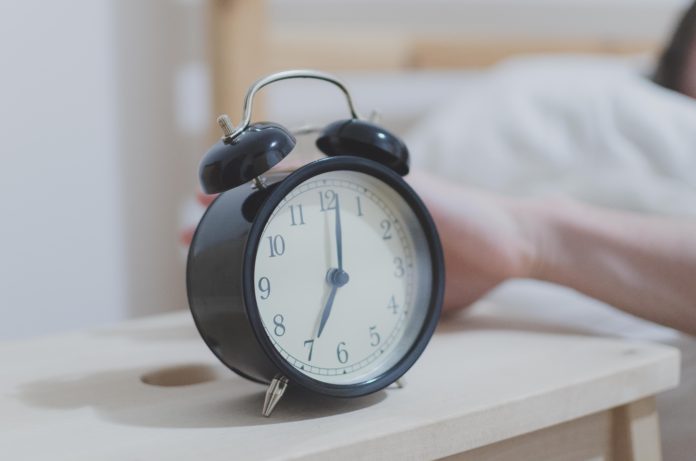It’s morning and you might have succumbed to the lure of hitting that snooze button multiple times and burrowing under the warmth of your blanket for another five minutes when suddenly… you realize you’re late! To tackle a problem, you first have to understand it, so before we get into our 10 tips to waking up effectively, let’s talk about the 5 stages of your sleep cycle.
5 Stages of the Sleep Cycle
There are 5 stages in a sleep cycle and each cycle ranges from 90 to 110 minutes. An average person normally gets about 4 to 5 cycles, which equals to about 6-8 hours per night.

- Introduction of Sleep
The first stage of sleep is called the Sleepiness or the Introduction of Sleep. This is a transitional phase where you’re partially awake and your mind begins to drift off, your brain activity slows down, and your muscles begin to relax. Since this stage is the introductory stage to sleep, you can be easy awoken. - Beginning of Sleep
The second stage of sleep is called the Light Sleep or the Beginning of Sleep. In this stage, you notice your heart rate beginning to slow down and a lower core body temperature. You can be easily awoken and become quickly alert. - Deep Sleep
- Slow-Wave Sleep
The third and four stages of sleep make up the Deep Sleep or Slow-Wave Sleep. These two stages occur forty-five minutes into your sleep cycle and are the hardest to wake up from. When you do wake up in the middle of your cycle, you will feel groggy and disoriented. - Rapid Eye Movement
The last stage is the R.E.M, which stands for Rapid Eye Movement. In this sleep stage, your brain is bursting with activity and dreaming occurs. With the exception of your lungs and your heart, the rest of your muscles are pretty much paralyzed. This stage of sleep is important because R.E.M helps to revitalize the brain, which supports the sharp and alert daytime functions. You normally being to wake up during this phase, and upon waking up, your core body temperature begins to rise in the preparation for the day ahead.
How does this affect waking up?
Knowing the stages of sleep help to determine how long it takes you to get ready for bed so that you can get the right amount of sleep hours to wake up refreshed in the mornings. By being mindful of what time you go to bed and how many sleep hours you need, you can start a sleep pattern to help your body become more adjusted.
Now that we are aware of how sleep works, let’s move on to some tips for helping you re-establish a healthy sleep pattern.
Tips to wake up effectively
There are many benefits to being an early riser which includes putting yourself on top of your schedule which helps you plan and organize your day, increase your productivity, avoid rushing out your door, and be able to eat breakfast!
Moderate exercises
When you feel sluggish, you’d find it even more difficult to get out of bed. Moderately exercising in the mornings may help combat against the daytime grogginess, and is not only good for your health but after exercising, your body temperature cools down and help to promote falling asleep. Regular exercising will help reduce insomnia, anxiety, and even symptoms of depression.
Stop Snoozing

Try your best to wake up naturally to develop your own body alarm. When you set alarms and pressing the snooze button is worse. This is because the body needs some time to get ready to wake up in the mornings, so when you snooze and go back to sleep, you’re giving your body false alarms and cause you to wake up over and over again. To combat the snoozing, it’s best to get straight out of bed once you wake up.
Scalp Massage
When you wakeup in the morning, comb your hair using your fingers and wrap your hands around your head. Gently tug and pull at the roots of your hair close to your scalp as a light massage. This will help stimulate the blood flow to your head to help you become more alert and refreshed to start a new day.
Hand Massage
Another approach is to massage lightly the area between the wrist and the palm of the hand. While this part of the wrist is sensitive, it helps to reset your senses while not putting you back to sleep.
Morning Stretch

When waking up in the morning, jump out of bed, wave your hands in the air, and do a big stretch. This helps your body wake up and let you know that you’re ready for the day.
Open the Window
The warmth of your body and the carbon dioxide potency can affect your sleep. When you open your window to let in fresh air after you wake up can help your body and brain go in full swing.
Eat Breakfast
Not only is breakfast good for you, it will also help train your body to develop the habit of feeling hungry early in the morning. This, in turn, helps you wake up early in the mornings. After all, why ignore an empty stomach?
Eat Apples

Apples are known to have a ton of benefits, but they also contain natural sugars which are even better than coffee to help you wake up in the mornings.
Eat Grapefruit
The smell of citrus can naturally make your body more alert, so having a glass of honey lemon tea will be an awesome way to start your day.
Take a Strong Mint
Think back to the last time you had a strong breath mint and that intense cooling sensation was more than enough to perk you up. So why not do the same when you’re waking up in the mornings? After waking up, immediately eat a breath mint or a menthol stick for an instant wakeup call.
For more tips on how to wake up, check out our full video: How to Wake Up Effectively




















